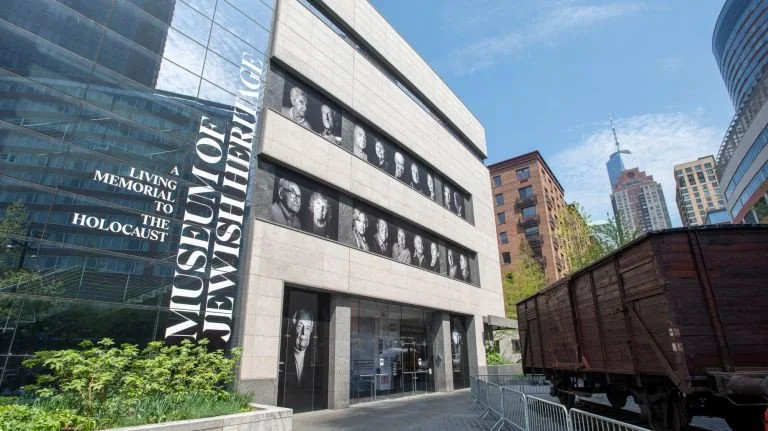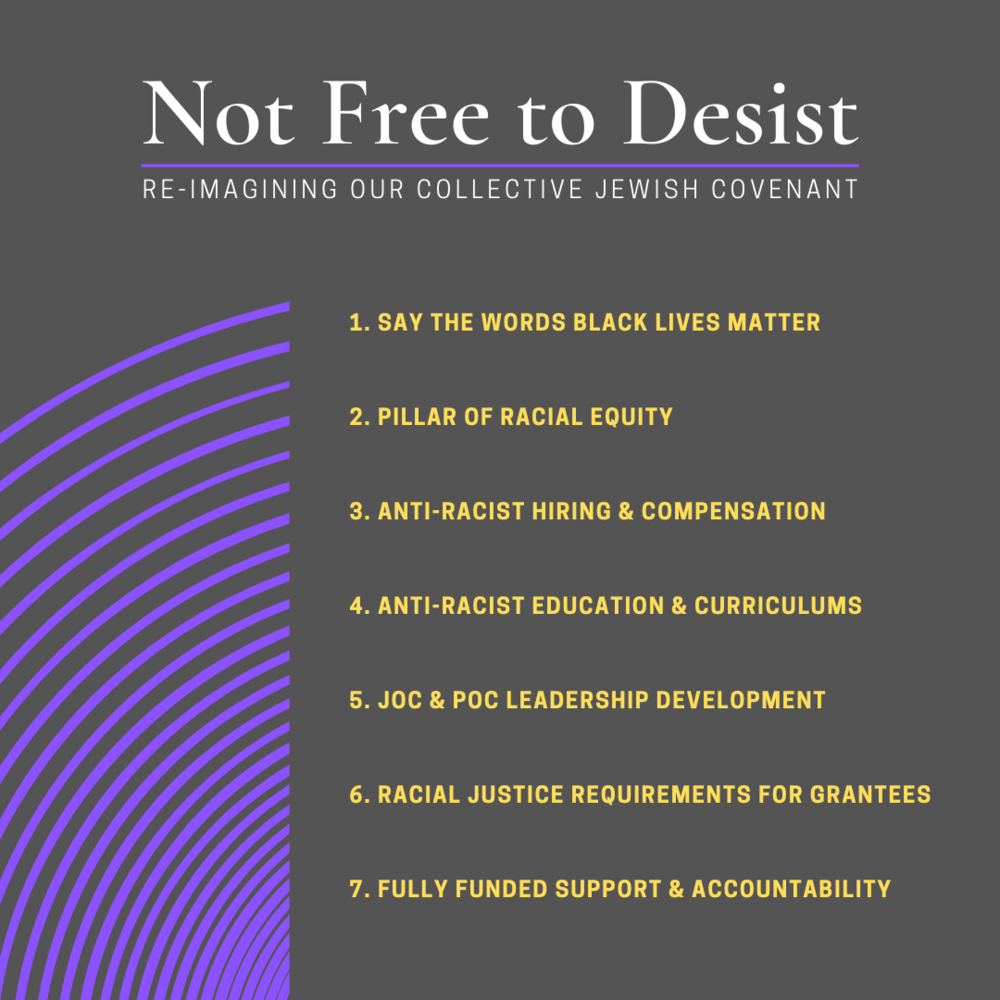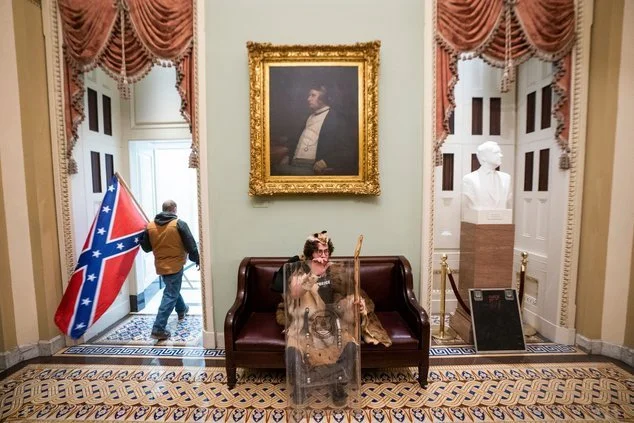An American Anti-Semitism Problem
By: Jessie Sander
Today, I woke up to the news that a Confederate flag was tied on the door of the Jewish Museum. As of now, there are no suspects. Of course, given the events of the week, it is not surprising. It is yet another anti-Semitic attack on a Jewish institution and, unfortunately accustomed to these events, I am familiar with the feelings that emerge. As an anti-racist Jewish educator, this week revealed to me that I have much more work to do on my racism and internalized anti-Semitism. But if I’ve processed these events so many times, why do I struggle to find the words to talk about it? Moreover, why is it so hard for us to talk about anti-Semitism? Because I’m not just a Jew. I am a white woman.
From amNY “Confederate flag found tied to Museum of Jewish Heritage’s door days after Capitol riot” https://www.amny.com/news/confederate-flag-found-tied-to-musem-of-jewish-heritages-door-days-after-capitol-riot/
On Wednesday, January 6th, armed fascists overtook the Capitol building in Washington D.C. for hours before law enforcement effectively cleared the building. As more information came out on social media, I saw the images I have come to expect for the Trump presidency: the confederate flag, MAGA hats, angry white men and women screaming. It wasn’t until later in the evening that I saw the Holocaust imagery. My Jewish friends and siblings posted the man in the Camp Auschwitz sweatshirt. More research into the images seen on Wednesday showed me the symbols I didn’t even know were anti-Semitic. Many of the men proudly photographed in the Capitol building that day are well-known neo-Nazis.
It made sense, of course. Neo-nazis have been endorsing Trump, showing up at his rallies, and openly discussing revolutions for years now. I have grown up understanding that Nazis are alive and well in America. In college, I learned how American racism and the structure of the American eugenics program inspired many of Hitler’s ideas. I have studied anti-Semitism in ancient Rome, during the Black Death, and prior to the Spanish Inquisition. I am well aware that anti-Semitism has existed long before the Holocaust and obviously continues long after it. Anti-semitism is also not just Nazi propaganda. It’s the hundreds of microaggressions that Jews face throughout our childhoods and far into our adult lives on a regular basis. Every Jewish person I’ve met has more than a few stories to share.
Something new struck me this week, though. I was preparing with my colleague Elana Lipkin to teach a youth workshop for our organization, Making Mensches. We created this organization to facilitate anti-racist workshops for white Ashkenazi Jews in an effort to improve the communities in which we were raised. Inspired by the Not Free to Desist letter published in June 2020, we are constantly evaluating how to de-center European Jewish experiences in Jewish spaces and create more welcoming communities for Jews of Color.
During our preparation, I realized how I’ve spoken to kids about anti-Semitism and Nazis in the past. “They’re not in power, so they can’t make the Holocaust happen again,” or “Yes they hate us, but they aren’t a real threat to us any more” are some of the common sentiments I’ve passed on. I realize that these are not only untrue but very white, Eurocentric, racist statements to make. Not only are neo-Nazis a major threat to all Jews, they are a threat to Black non-Jews and people of color everywhere. The Nazis enforced a racial purification program and a eugenics program modeled after American white supremacy. The ideologies perpetuated by Nazi symbolism are not just hatred of Jews; they are symbols of the desire for a racially purified society in which the Aryan race can thrive. Trying to assuage fear of Nazis by assuring white, Jewish kids they “can’t get us anymore” is as racist as suggesting it’s “not our problem.” I recognized the need to confront my own racism and the need for different rhetoric in our workshop.
Racism complicates the discussion of anti-Semitism in America. Why is discourse around Nazis so Eurocentric when Nazis were inspired by American Jim Crow laws, American massacres of Native Americans, California’s forced sterilization program and Nevada’s gas chambers? Why, when Nazis are storming the Capitol, do I have a desire to hide my feelings and refuse to talk about anti-Semitism?
From Gothamist.com “Trump Fur-Ever: Costumed Capitol Rioter Is Son Of Brooklyn Supreme Court Judge” https://gothamist.com/news/trump-fur-ever-costumed-capitol-rioter-son-brooklyn-supreme-court-judge
Because my whiteness allows me to choose whether or not to face my oppression. One of the men identified in the Capitol building on Wednesday has been identified as the son of a Jewish Supreme Court judge from Brooklyn. In a video from the Capitol on Wednesday, he proudly gives his name as Aaron and cites the importance of following the Constitution. When asked why he’s there, Aaron says “to express my opinion as a free American.” We know there are a large amount of Jewish Trump supporters. However, one may wonder how a Jewish man, even a Jewish Trump supporter, could feel comfortable marching in a violent mob containing Confederate flag wavers and neo-Nazis? The answer is: whiteness. While white Jews in America certainly feel the fear of seeing Nazi imagery in the Capitol building, we are still protected by our whiteness. Aaron demonstrates the bubble in which some white Jews live: aware of anti-Semitism, but sheltered enough by whiteness to feel empowered to join in white supremacist violence. Aaron does not seem to show any fear of being beaten, shot or killed by armed law enforcement. Can our Black Jewish community members say the same?
The discussion of anti-Semitism needs to be nuanced. While anti-Semitism oppresses all Jews, white Jews benefit from white privilege. White Jews can choose to oppress Black Jews and Jews of Color anytime — and do. White Jews can choose to oppress Black people and people of color anytime — and do. That does not mean that anti-Semitism is not a real threat to Jewish people or that it should be normalized. It does not mean that we can excuse anti-Semitic comments, like Congresswoman Miller’s assertion that “Hitler was right,” by pledged support of Israel. Congresswoman Miller apologized, saying “I’m passionately pro-Israel and I will always be a strong advocate and ally of the Jewish community.” Conflating support for Israel and support for the Jewish community is dangerous and often untrue. As we saw at the Capitol, an Israeli flag was flown in the same crowd as Confederate and QAnon flags. Support of Israel must not be used to excuse anti-Semitism because support of Israel and anti-Semitism can exist simultaneously.
We need to reexamine our understanding of anti-Semitism. We need to center the experiences of Jews who experience racism and anti-Semitism on a daily basis. Anti-Semitism must be confronted more often, not just when cemeteries are desecrated or neo-Nazis show up at the Capitol. And white Jews must continue to understand how our whiteness shelters us in American society and allows us the privilege to join the racist mob when we want to. We have to accept that this anti-Semitism is American-born and bred. We must confront our American anti-Semitism problem.



